—Jada Pinkett Smith
—Dr. Grace Lee Boggs, philosopher and Detroit community organizer
—ECO Girl Parent
Recent Events
Through actions both large and small, girls, and the women they will become, have the power to care for the earth and strengthen our human communities. See what members of the ECO Girls have been doing to make a difference, and read about ways that we can all contribute toward building a positive future with and on the earth.
During this event, over fifteen individuals ranging from college and graduate students to faculty and staff members, community members and environmental professionals spent a day sharing their perspectives on the environment and black women's place in it. Discussions were based on questions such as: “Why should we as black women/women of color/women care about land? Our opening question led to an engaging conversation in which the historical displacement of African Americans from the land was a prominent theme. Highlights included observations such as: “we don’t have a choice, because we are always navigating it [land] to care for others”, and “we need to care for the land for the generation after us to pass it down.” Words commonly used in the discussion were: care, nourishment, navigation, and nutrients. After a working lunch, participants brainstormed definitions for the terms “ecowomanism,” “ecofeminism” and “black feminist environmentalist” in order to compare fit and usability. (While ecowomanism received the most enthusiastic response, limitations of the term and its associations were noted.)
The group then spoke via Skype with geologist and environmental studies scholar Dr. Lauret Savoy about her prize-winning book, Trace: Memory, History, Race, and the American Landscape. Dr. Savoy answered questions openly and with sensitivity, explaining how she found the strength to write the work after years of self-sabotage due to believing that people did not want to hear her story and describing how the places she had visited over her lifetime “chose her” rather than vice versa. She depicted these places as palimpsests with layers of meaning that impacted her life and inspired a similarly reflective attitude within our group.
We ended the day with a free-write to gather our thoughts and then a large group reflection that revealed new insights and shared inspiration to continue engaging these questions and research areas.
Reflections from Michigan State University Participants at the ECO Girls / BlackGirlLand Project Earth Day Retreat
“Of Sea and Thunder and Spring” Student Reflections
by Tamara Butler, Assistant Professor, Department of English; Department of African American & African Studies, Michigan State University
Land. Ethics. Responsibility. Care. I am still thinking about what it means to be a BlackGirlWoman who is from the South Carolina Sea Islands. On April 21, I traveled from Lansing to Ann Arbor with a colleague from the James Madison College (Tacuma Peters) and students enrolled in my African American and African Studies course (AAAS 390) I teach at Michigan State University. The special topics course, Black Girl Land Project, stems from my current research that explores Black women’s rememory of the South Carolina Sea Islands. In the course, students explored various texts to think about how Black women negotiate, remember and imagine their connections to rural spaces. Therefore, we placed poetry from Camille Dungy’s Black Nature in conversation with Xaviera Simmons’ art, Julie Dash’s Daughters of the Dust, Lauret Savoy’s Trace, Gloria Naylor’s Mama Day, Beyoncé’s Lemonade, and more. Therefore, when we entered the Michigan League that morning, we were carrying these women, their visions and their imaginations with us.
While I could recount each activity, conversation, I am interested in expressing gratefulness—because that is what still resonates with me.
I am deeply grateful for all of those who were able to contribute their voices or their ears to the day’s conversation. I am still thinking about one student’s concern of being from Ann Arbor, but not feeling like she is a part of the city. I hear a student asking Lauret Savoy about her conceptions of “ecological footprint” and how she wants to think about footprint as connection to the land, rather than destruction of the land. I am grateful for Tiya’s deep listening, as she meticulous took notes during our three rounds of conversation and offered our ponderings back to us as ruminations and questions. I am grateful for the Ms. Beth James for sharing her stories and memories with us. At no point did I feel like a stranger—instead, I felt listened to, heard, respected, and trusted. It is my hope that some of the following reflections begin to make clear the ways in which some of the students engaged with the readings, the course, the retreat and their own imaginings.
Da’Chana Blaydes, MSU student
Through the course and the retreat, I learned about Dr. Butler’s Black Girl Land Project and Dr. Miles’ ECOGirls. I found these projects to be pretty dope! The ECOGirls website and the retreat gave me more insight on how I can connect to land. After spending time talking with some of the women attending the retreat, I would like to see more young individuals involved in this kind of work. I will say that it may not be the easiest thing to get younger individuals hooked in, but I would love to this turn into a revolutionary movement. Ever since Dr. Butler’s class and attending the retreat, I have been thinking about how projects like ECOGirls could positively affect the Black community—not just getting Black women in tune with land as an act of resistance, but also building healthier communities and taking ownership of land. During the workshops, I reflected on most of the readings assigned for Dr. Butler’s class, but I specifically remember the two readings, “Ecowomanism: Black women, religion, and the environment” (Harris, 2016) and “This na true story of our history: South Carolina in Sierra Leone’s historical memory” (Blyden, 2015). In “Ecowomanism”, Melanie Harris focuses on the perspectives of Black women and Women of Color as they confront multilayered oppressions such as racism, classism, sexism, and environmental injustice. She highlights Alice Walker and bell hooks as foundations of ecowomanism and the presence of Black women in the environmental justice movement. The reading also acknowledges it as a discourse that examines the intersections between religion, gender, ethics, and ecology. Between the readings and the retreat conversations, I began to think about the intersectional lines of oppression experienced by women of color and the earth.
Danyale Dockery, MSU Student
My grandmother grew up in the South, where she was forced to pick cotton as a means to help provide for her family. I wish my grandmother could have learned about land as I have. Land grows its own beauty, hold its own shape, and features its own characters. Land is essential to the soul, as humans we need land to survive. Land can provide food, moistures, and comfort. The land grows food and seasoning to prepare meals. The land grows trees, from which coconut and shea butter oils are extracted to moisturize skin and hair. (I shared this information through a workshop I did with a small group of high school students). The land is comforting to me through water as I feel the most at peace when I am near bodies of water. The retreat helped me reflect upon my connections land and my grandmother, as it gave me the space to remember her.
View photo gallery of the event
In celebration of Earth Day, ECO Girls hosted an event called, “The Power of Water: An Earth Day Exploration!” At this event, we explored the wonders of water. After playing name games and icebreakers to get to know each other better, Dr. Rebecca Meunich of the University of Michigan’s Graham Sustainability Institute led the group through a presentation on our freshwater ecosystems, watersheds, water pollution, and the freshwater filtration systems utilized to clean the water we consume and discard. The group then engaged in discussion about earth’s limited amount of freshwater; access to clean water; and a number of politics that are affecting Michigan residents’ access to clean and fresh drinking water. Collectively, the EcoGirls -- both young and old -- marveled at the power and strength of water as we shared stories and water-related anecdotes with each other.


(Make your own drink directions with this recipe)
Following the presentation and discussion on our freshwater ecosystems, the group took a tour of the botanical gardens. First, we walked through a quilted art exhibit called “A Cloth of Earth and Sky: The Healing Power of Nature through the Eyes of African American Quilters” wherein artists from the Great Lakes region shared stories and expressed pieces of their cultures through quilting. Among a variety of fabrics, colors, and patterns, all sorts of unique quilts were exhibited -- even those created by students from Flint, Michigan, a population directly affected by unclean, toxic, lead-filled drinking water. After the Eco Girls took a close look at these quilted artworks, we continued our tour of the botanical gardens and walked through the conservatory -- an indoor space that hosts all sorts of plant life between three different climate zones: tropical, temperate, and arid. We focused on the changing atmospheres, the unique roles that water plays between climate zones, and the different elements of the water cycle (transpiration, evaporation, condensation, precipitation, runoff, etc.).
The Eco Girls then learned a bit about Water Goddesses across cultures and countries (namely the goddesses: Yemoja, Sedna, and Magwayen). After learning about the great influence and strength of these Water Goddesses, the girls were asked to create their own strong and powerful goddesses. In creating a world, originating body of water, and strength / skill sets for their goddesses, the Eco Girls told a story about their own Water Goddess, and made accompanying head adornments and shawls that represented and animated their powerful deity creations. This imaginative exercise was deeply empowering as it urged the participants to embody and reflect upon their many unique strengths and skills. In wrapping up the ECO Girls Earth Day and Water Exploration event, we toasted our edible aquifers to a bright future of powerful and imaginative young women, celebrated our unique selves and our environment, and collectively, we engaged in critical thought and discussion surrounding access to clean water and Michigan’s water politics. View more photos from the event.
What is in the ground we walk on? With the spring season finally breaking through, we are looking to flowers and plants to let us know that it is time for the earth’s renewal! One of the most important aspects of a plant’s development is the soil it grows in. This month, ECO Girls collaborated with the University of Michigan organization, Females Excelling More in Math, Engineering, and the Sciences (FEMMES), on their annual Capstone Event. With more than 200 4th and 5th grade girls in attendance, we were able to share our enthusiasm about the earth by testing different types of soil for their nutrients. Several Eco Girls came to campus for the FEMMES day-long event and also took part in the soil activity led by ECO Girls volunteers. All of the children who participated in the soil activity were able to conduct their own experiments and offer thoughts on what type of soil they would prefer to plant in. Thanks to ECO Girls staff and our collaborators in FEMMES, we have created 200 skilled little gardeners for this spring’s planting season!
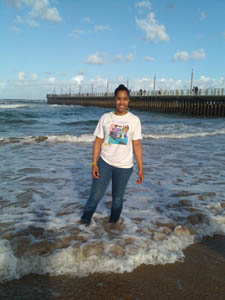
ECO Girls Project Coordinator and Camp Director, Zakiyah Sayyed, has journeyed to the province of Kwa-Zulu Natal, South Africa, where she now resides in the city of Pietermaritzburg. Zakiyah is currently a Research Fellow with the Centre for AIDS Programme of Research in South Africa (CAPRISA). CAPRISA is known for innovative work in HIV prevention technologies with extensive experience with female populations. Zakiyah is stationed at CAPRISA’s Vulindlela Clinical Research Site where her projects include work in the areas of: HIV/AIDS in adolescent populations, social mobilization, community engagement and community lead approaches to infection reduction.
Zakiyah misses the ECO Girls team and participants during this time away but is staying close via email, Facebook, and Twitter!

What was one gift as a child you always wanted? A dollhouse! It was the perfect platform between the real and the make-believe. At ECO Girls we mixed our two favorite things, sustainability and fun, to create our own Green Dollhouses! This was our 2nd annual Green Dollhouse event and we invited girls from all over the area to be completely hands-on in their dream dollhouse. This year's concept was different from last year: this time the girls were given the task of creating an entire town.
The girls were divided into groups, each of which had the task of creating a blueprint and detailed summary of what they would create and presenting it to the entire group. The girls spent about an hour and a half buying and trading materials that were eco-friendly and perfect pieces to their community-based buildings. By the end of the day, they had created a town with a hospital, school, grocery store, housing, and two amusement parks. We were all able to put on our creativity hats for the day, and become engineers, architects, and urban planners!
We appreciate all of the Eco Girls who came out, and can't wait to see everyone again at our next event!
To view more photos of this event, visit our photo page.

ECO Girls is off to a wonderful start — our first event for the fall 2013 semester was remarkable! We met at the YMCA in Ann Arbor, and our topic for this event was the importance of food and nutrition. We began the event by completing a word search to find words such as “organic”, “gmo”, and other nutrition related words as a way to learn new vocabulary. We later discussed and defined the words that were new to us.
Following the word search, the Eco Girls were split into groups to read an article about the importance of agriculture and organically-grown foods. They split up the article and presented what they read in their own words. The activity was extremely educational and we were all very excited to learn more about the importance of non-hormonal foods.
Later, we ate a delicious meal from Silvio’s, which only serves organic pizza, and then we walked to the farmer’s market in Kerrytown for our scavenger hunt. The girls were able to ask the local farmers different questions such as: “What time did you wake up this morning?” and “Is your farm a part of a family business?” They were very enthusiastic about learning more about food and harvesting!
After doing an experiment that allowed us to pull the iron out of fortified cereal using a very strong magnet, we concluded our session with a discussion of what characteristics make a great friend.
Download the vocabulary worksheet, the scavenger hunt, and the word search from our event.
To view more photos of this event, visit our photo page.
The 2013 ECO Girls Earth Day weekend event was spectacular! While the weather outside was a bit frosty this April, our girls were on fire.
Once again, our friends at the UM School of Natural Resources and the Environment (SNRE) were our gracious hosts at the Gold LEED certified green Dana building. The girls crafted natural air fresheners, which are great alternatives to chemically laden synthetic air fresheners, and embarked on a scavenger hunt. SNRE did an amazing job of teaching ECO Girls how to live a modern lifestyle in harmony with Earth.
After the sun set, the Student Astronomical Society opened up the night sky, literally, inside the Angell Hall planetarium. We were all thoroughly enraptured as the night sky shifted and tumbled above our heads. We also went up to the observatory and took a look at the telescope. Too bad it was a little too cloudy for stargazing.
On Saturday, the sun shone as we planted trees with the Greening of Detroit in River Rouge Park. Wow. We really used our muscles that day. Some of the girls were actually knee-deep in dirt after digging out holes big enough for our tree roots. The incredible volunteers and staff at the Greening of Detroit explained the all the details of tree planting — it’s really not as easy as you’d think! Afterwards, ECO Girls were very eager for lunch back in Ann Arbor.
Our closing ceremony for our last event of 2013 was a bittersweet moment. We hope everyone has a good summer. Keep expanding your roots of knowledge and keep reaching for the sky — just like those trees we planted!
(Angell Hall planterium: http://www.lsa.umich.edu/astro/facilities/telescopes/angellhall. Also, visit the Greening of Detroit website for more educational opportunities: http://greeningofdetroit.com/.)
ECO Girls staff members and volunteers shared a high point this April when we got together to celebrate a great occasion. Mallory Horne, the fantastic curriculum specialist and lead teacher for ECO Girls, is expecting a baby daughter at the end of the summer. The happy occasion gave the rest of the ECO Girls staff a perfect opportunity to think about what kind of celebration a baby shower should be when environmental values are taken to heart.
How do you plan a baby shower in ECO Girls style? Well, for our Eco Baby Shower, we set the tone by emphasizing basic and recycled decorations. We had beautiful spring garden flowers on display in vases, and we used old ECO Girls flyers cut into the shape of baby ducklings to string around the room. Our refreshments were homemade, with fruits and veggies in shades of green because we just couldn’t resist crossing the line into cutesy. We discouraged showering the mom-to-be with a deluge of newly-purchased, manufactured, wrapped gifts. Instead, we focused on pooling funds to buy a gift card to a natural baby store in our area that carries practical and sustainably-made items. We knew that Mallory would spend our collective gift to build her supply of reusable cloth diapers, which is exactly what she did. (Mallory, a skilled seamstress, had already sewn several cotton diapers from a pattern at home.)
For party favors, we distributed wildflower seeds; for party game prizes, we gave away baby tomato plants and beeswax candles. For one of our games, we developed a new take on the traditional Guess the Baby Food shower game. Rather than having people taste the baby food to guess what kind it was, we covered the labels and had people guess by sight. This meant that our baby food jars were perfectly preserved and could be donated to families in need after the shower. The baby food from Mallory’s party went to SOS Community Services, a local non-profit that serves homeless families. Our most intense game was a challenging ECO Baby Quiz, created by ECO Girls program manager, Alyx Cadotte, which taught us all quite a bit about environmental issues that affect pregnant mothers and young children. The winner of our very tough quiz was the guest of honor, Mallory! It looks like she is more than ready for Eco Mommy-hood. Congratulations to Mallory and her husband, Andrew, on their baby- to-be!
Want to join in on the fun? See how you do on our Eco Baby Quiz!
To view more photos of this event, visit our photo page.
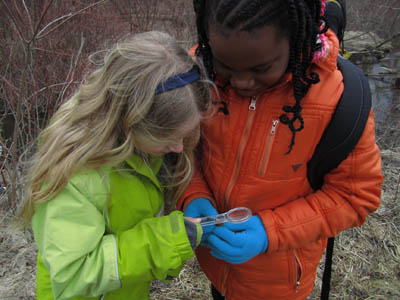
For the first ECO Girls event in March, the ECO Girls met at Trotter Multicultural Center to learn more about ecological literacy. We began by reading the book Log Hotel by Anne Schreiber, about how a fallen tree decomposes and becomes part of the earth again. Then the girls worked together to identify producers, consumers, herbivores, carnivores, and omnivores and the differences between them. For our last activity, we used library books on plants and animals to look up producers and consumers to make food chain mobiles.
On March 23, ECO girls explored nature and plants at the Matthaei Botanical Gardens in a combined Roots and Shoots session. We played games and wrote in journals at Trotter then boarded the bus to take us to the botanical gardens on N. Dixboro Road. While on the bus, the girls enjoyed fresh strawberries, bananas, blueberries, and two types of homemade French toast. Once we were all done eating lunch, our first activity was a nature hike around the Sam Graham Tree trail. On the trail, the girls saw many types of trees and plants, investigated animal tracks, and tried to get as close as possible to the many streams running through the grounds. We also saw geese standing on a frozen pond and a labyrinth for quiet meditation.
After the hike, ECO girls journeyed inside to explore the conservatory. There was a dry section with cacti, a sub-tropical section, fish in indoor ponds, and even a pineapple plant! Using pastels, watercolor paint, and colored pencils, the girls made many beautiful pieces of art based on the plants and fish they observed. We were sad when we finally had to take the bus back to Trotter since we had so much fun. Luckily, the botanical gardens are free and open to the public so families can plan a visit too!
To view more photos of this event, visit our photo page.
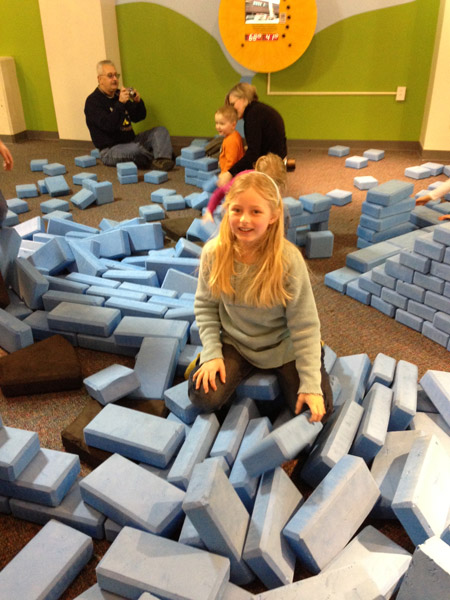
For the month of February, our themes were Energy and Sustainability. On February 2nd, the ECO girls had a split session with a discussion on sustainability and some fun puzzles that taught us a few facts about what being sustainable means. During this session, we were also excited to have some visitors from the African dance group Amala join us for a brief dance lesson. Everyone learned a few moves and got the chance to hear about where the dances came from. It was a cold and snowy day, but we had lots of fun inside.
On February 16th, we went on a trip to the Ann Arbor Hands On museum to continue our exploration of the themes of Energy and Sustainability. We learned a lot about solar energy collection from the museum’s exhibits and also about the Whirlydoodle wind energy project on our walk there. After the girls finished up their energy worksheets, they enjoyed some free time in the museum and we ended our time there with the chance to purchase some souvenirs in the gift shop.
To view more photos of this event, visit our photo page.

ECO Girls kicked off 2013 with an exciting trip ice skating at Campus Martius Park in downtown Detroit. We were glad for the opportunity to visit again, since it was one of our favorite destinations last year. It was also helpful for some parents to be able to drop their daughters off a little closer to home than Ann Arbor.
Before we left the Trotter Center everyone played a fun question and answer game. We received some really surprising and insightful answers to questions like "What is your favorite part of being a girl?" and "Name a woman you admire and why?" Our bus ride passed quickly with a few road trip games and a lunch of yummy quesadillas.
When it was time to skate, some of the girls were a little wobbly at first, but the more advanced skaters were very willing to lend a hand. The weather cooperated with a sunny 45 degree day and the girls really enjoyed the chance for some outside exercise. We wrapped up our day by watching the zamboni clean the ice, drinking our hot chocolate, and taking a moment for a group picture in front of the fountain.
We were glad to see that more girls were able to make the trip this year and want to say a big thank you to our volunteers for making this trip possible!
To view more photos of this event, visit our photo page.

In the month of December, the ECO Girls learned about and explored the theme of sustainability through the Green Dollhouse Project. With the holidays around the corner, the Green Dollhouse Project provided a unique opportunity for the girls to tie in their creative holiday-themed ideas to help build a sustainable and eco-friendly dollhouse. The morning started out with some background knowledge and information about the theme of sustainability. Through an the interactive presentation, the girls were able to share and discuss their ideas of what it means to build a sustainable and eco-friendly home.
After learning about the background and basis of the project, the girls were split into different teams. Each team was responsible for having four sustainable elements in their Green Dollhouse. After working together to create a design, each group had to have their design approved before being allotted money to build their dollhouse. Once their designs were approved, each team received $500, which they could use at the Supply Shop and Service Center. By working together and bouncing ideas off one another, the girls were able to create very intricate Green Dollhouses that displayed their groups ideas and creativity. And to make them a bit more festive, some groups incorporated a holiday theme for their house. Upon completion of their house, each group presented their hard work to the rest of the groups and shared the different kinds of eco-friendly and sustainable elements that they had incorporated into their design. The Green Dollhouse Project was a huge success and was a great way for the girls to work together and express their creativity.
To view more photos of this event, visit our photo page.
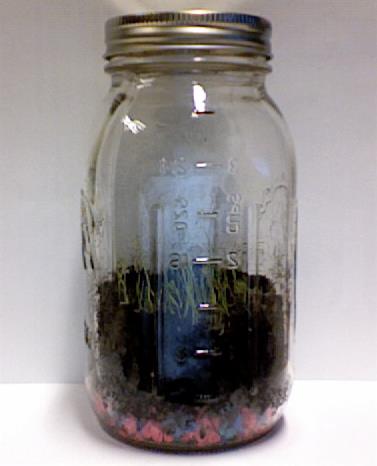
In the month of November we focused on the theme of ecological literacy. For our first event, we constructed homemade terrariums at the YMCA. This project consisted of placing dirt, rocks, grass seeds, and water inside of recycled glass containers and then letting Nature take over. These small terrariums, which represent our earth, are miniature ecosystems formed by the processes of water evaporation and condensation. Each child was allowed to take one home and watch the terrarium to see what happens when plants actually grow on earth. As the cycle continues, the grass grows tall and strong.
In November we also produced our first children’s story! “The Thankful Turkey & Her Friends” is a short story written by UM undergraduate Brianna Winbush and illustrated by the Eco Girls. It is a tale about togetherness, gratitude, and the merging of cultures inspired by the form of traditional African folktales. Each Eco Girl dedicated a little bit of her artistic ability to illustrate one scene of the story. All of the artists had a hand in creating our mosaic-like cover. “The Thankful Turkey & Her Friends” is a holiday must-read for fall-winter 2012-13! You can find the PDF here.
To view more photos of this event, visit our photo page.
On a sunny Saturday in late October, the Eco Girls had the opportunity to visit an amazing organic urban farm in Detroit called D-Town Farm. Many of the Eco Girls traveled from Ann Arbor to the farm on a University of Michigan bus, eating a lunch of delicious burritos prepared by several of the university undergraduate student volunteers who accompanied the girls on the trip. This group met up at the farm with additional Eco Girls from Detroit, along with a few of the girls’ brothers and even one mom who joined the Eco Girls for the tour of the farm.
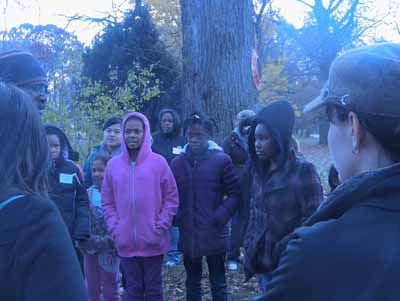
At D-Town Farm, one of Detroit’s largest urban farms, one of the founders of the farm, Baba Malik Yakini, hosted the visit along with his colleague, Farmer John. We learned that the farm started out as 2 acres, within the borders of the River Rouge Park, which is Detroit’s largest park. Today the park totals seven acres.
During the girls’ two-hour visit at the farm, Baba Malik talked with them about the important roles that Africans who came to our country as slaves and who worked on plantations as slaves had in our country’s agricultural history. They were instrumental to the success of these plantations. He also told the group about several foods that these Africans introduced to the U.S., including sesame seeds and certain varieties of rice.
Before getting an in-depth tour of the farm and helping out with several farming chores, the girls learned about why urban farms in cities like Detroit are so important to the local community. In Detroit, there are no longer any major supermarkets available for the residents to buy their food. They’ve all closed down, leaving for many people only gas stations and party stores as places where they can get food, with limited choice and without the possibility of buying fresh produce. Without fresh fruits and vegetables, people’s diets are much less healthy so they’re prone to get sick more frequently.
The Eco Girls then went on a walking tour of the farm, mainly in the original 2-acre area, with Baba Malik and Farmer John. The girls learned about the variety of foods grown on the farm, including different kinds of kale and squashes, tomatoes, mushrooms, herbs, lettuce and sunflowers, for their seeds. Some of these crops, like lettuce and herbs, are grown in open fields in the summer, and then during cold weather inside hoop houses where the temperature is much warmer and the crops are protected from ice and snow. Since many of the crops had already been harvested earlier in the fall, there weren’t a lot of things still growing in the outside ground, except for a few hearty varieties of kale and maybe a few other greens.
Whenever any of the girls had questions about the farm, Baba Malik answered them very patiently and with the skill of a seasoned teacher. The atmosphere during the whole tour was relaxed and very conducive to asking questions and learning more about all the ways the land was being used to grow food for people in the city.
One of the first stops on the tour, after seeing the kale still growing in the ground, was a set of bee-houses. Honeybees live in these houses and produce enough honey for themselves and for D-Town Farm’s beekeeper to collect to sell.
Baba Malik also spent time explaining the full biological process of composting and why that’s such an important aspect of farming. Everyone also got to see the area where the compost piles were kept.
One of the next stops on the tour was the hoop houses, where the temperature was probably 20 degrees warmer than outside. One of the purposes of having the hoop houses on the farm is to show people how even in a relatively small yard, a family could have a hoop house to grow vegetables. Everyone was invited inside the farm’s hoop house to see what was growing and see for herself how hot it was inside! One group of Eco Girls later went back into this hoop house with Farmer John and ECO Girls faculty director Tiya Miles to help separate the cloves of garlic from the large bulbs of garlic that had been planted. On the tour Baba Malik also stopped to show the Eco Girls where farmers were experimenting with growing mushrooms on logs.
Two other farming chores that Baba Malik asked the Eco Girls to help out with involved moving bales of straw in a big wheelbarrow to the area of the farm that had the composting piles. While one group of girls did this, and a second group picked garlic, the third group took the heads off of the flowers of very tall sunflower plants. They collected all of the heads and put them into a large bag, which would later be used to collect the sunflower seeds from each head. The girls also helped Baba Malik pull the large sunflower stalks out of the ground, cut them into smaller pieces, and load them into a wheelbarrow to be taken out to one of the compost files.
Baba Malik told everyone about the Harvest Festival that the D-Town Farm hosts on a weekend every fall. The festival includes tours of the farms, workshops on gardening, bee keeping, composting, and preparing foods, as well as activities for children and live music. He invited the Eco Girls to come to next year’s festival, and suggested they could work on a project during the year that they could then demonstrate at the festival. This is something the ECO Girls leadership team is excited to consider!
Before the girls got back on the bus to head to Ann Arbor, and parents of the Detroit Eco Girls picked them up, Baba Malik talked about the importance of careers and jobs involving food, and encouraged everyone to think about these kinds of jobs as ones they might want to pursue when older. Several Eco Girls told him that they did want to be farmers. Baba Malik also pointed out other jobs related to food, such as being a chef or having a restaurant or food market for your community. Everyone thanked Baba Malik and Farmer John for their generosity in spending so much time with the group and teaching the Eco Girls all about urban farming and the importance of having city farms to grow healthy food for the residents of Detroit.
On the bus trip returning to Ann Arbor, the Eco Girls had lively conversations about the farm while a few took naps after their long walk. They also enjoyed a snack of delicious pumpkin bread that Mallory Horne, ECO Girls’ lead teacher, and Alyx Cadotte, ECO Girls’ program manager, had made from a huge pumpkin that had been home grown and donated by Wayne High, office manager in the Dept. of Afroamerican and African Studies at UM. Some of the girls marveled that the delicious bread could come from a pumpkin. Mallory Horne has therefore collected some tasty pumpkin recipes that the Eco Girls and their families can try at home. Visit our Recipes page to see what she found.
The trip to D-Town Farm was really fun and informative for everyone. Perhaps time on the farm will inspire our Eco Girls to start a garden next spring and grow some fresh vegetables or sunflowers for their families. And maybe they will event want to grow their own giant pumpkins!
(Note: For our readers who would be interested in helping out at D-Town Farm, there are volunteer hours every Saturday and Sunday. Learn more about the farm at http://dtownfarm.blogspot.com/.)
To view more photos of this event, visit our photo page.
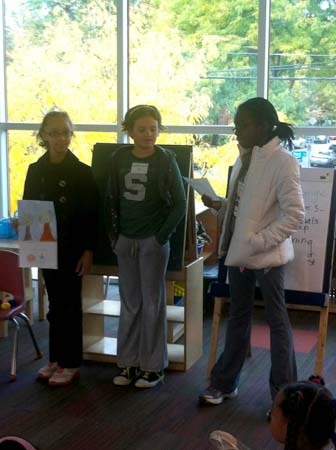
Today, October 6, 2012, ECO Girls explored our themes of food and climate change by discussing its effects on our food harvests. First we had a discussion about the nature of climate change. We then took part in a current events activity. We read articles that gave us different perspectives on farmers who face direct climate change challenges. ECO Girls read the articles then presented a written summary and a piece of artwork to describe what we learned from the corresponding articles. We learned about the challenges apple farmers have faced this year because of warmer, drier growing conditions, and that as global warming escalates it will be harder to grow certain crops such as apples.
Next we had an "apple race." ECO Girls played the role of farmers, each placed at different stations that represented Fiji, Washington State, New York, and Michigan. Each of these "farms" were located different distances away from our pretend Michigan farmer's market. Each ECO Girl farmer was tasked with delivering the same number of apples to the Michigan farmer's market in a given amount of time. After catching our breath we realized that it took the farmers located further away from the farmer's market more energy to complete their task. More energy translated into reality means more fuel is needed to transport crops farther distances. More fuel means more pollution; more pollution means hastening global warming.
After our presentations and our apple race, we clearly understood the benefits of buying locally grown produce, and had a greater understanding of our own contributions to climate change. In order to stop the cycle of higher green house gas emissions, which lead to warmer climates, which result in decreased produce, it is important to understand the role that we all play in the changing climate of our planet. After today, we are well on our way.
To view more photos of this event, visit our photo page.
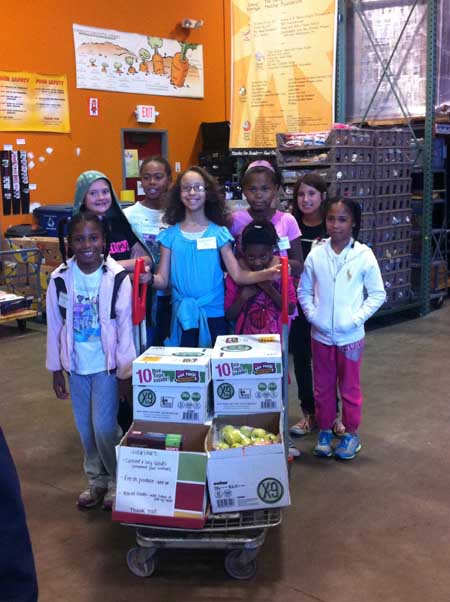
This September the ECO Girls theme was food. In Washtenaw County, where the University of Michigan-Ann Arbor is located, one in seven adults and one in six children struggle with hunger. Not knowing where your next meal will come from may seem almost unfathomable for the average UM student; however, people just like you and me deal with this dilemma daily. In our first session of this new academic year, the Eco Girls and their chaperones learned about the problems of hunger and food insecurity in our community and considered what we could do to make a positive contribution. Our response was to organize a food drive and tour of Food Gatherers.
Food Gatherers is a non-profit organization located in Ann Arbor that provides food assistance to 150 non-profit agencies and programs throughout Washtenaw County. To prepare for our visit to Food Gatherers, ECO Girls collected over 100 pounds of food for those in need. Most of the haul consisted of fresh vegetables grown by Wayne High, the office manager of the Department of Afroamerican and African Studies and an avid home gardener. Other items were canned goods contributed by the Eco Girls’ families, ECO Girls volunteers, and staff and faculty of Afroamerican and African Studies.
During our visit to Food Gatherers we learned all about the mission and goals of the organization. On our tour of the warehouse, the Eco Girls saw tons and tons of food and beverages. Most importantly, we learned how important it is for families in need to not only have access to food, but healthy food. Food Gatherers makes sure to distribute lots of fresh produce, much of it grown in their own garden right outside! The Eco Girls learned how easy it is to volunteer at Food Gatherers and to donate just some of what you have in order to help strengthen our community. So the next time you come across those extra cans of green beans in the cupboard, remember the importance of sharing and consider donating to Food Gatherers! Visit their website at http://www.foodgatherers.org/.
To view more photos of this event, visit our photo page.
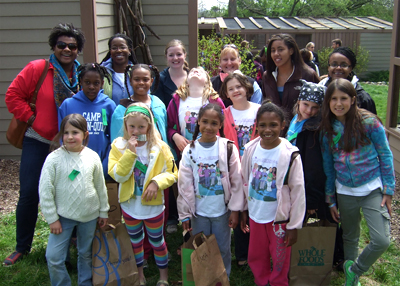
The Eco Girls had an amazing time celebrating Earth Day on April 21 and 22. Our weekend started out with a tour of the Dana Building on UM’s campus, which houses the School of Natural Resources and Environment (SNRE). The Dana Building is a Gold LEED certified green building that underwent a 5-year process to become more sustainable. The girls learned about using recycled construction materials, creative ideas for temperature control and light, as well as the amount of retrofitting a structure needs to “go green.”
Following the tour, the girls were led through a series of hands-on sustainability stations where they explored ways to be greener in our everyday lives. The tour and the stations were generously provided by the Teaching and Inspiring Environmental Stewardship (TIES) program in SNRE and led by their knowledgeable and enthusiastic docents. We wrapped up the evening with a showing of an inspiring documentary “What’s On Your Plate” and some time for creative expression around the Five Pines of ECO Girls.
Sunday morning, our day began with breakfast in the beautiful atrium of the Dana Building and a presentation by Starlet Lee, a champion tree climber from Detroit. Starlet was an engaging speaker and brought all of her equipment with her for the girls to see. When she took the group out to the Diag to continue her talk, our contact at Channel 4 News showed up to shoot some footage! Two of our Eco Girls did a fabulous interview, and the footage of Starlet was on the news that night at 6pm.
The last big activity of the weekend was heading up to the Leslie Science and Nature Center (LSNC) for this year’s Earth Day festival. The LSNC staff was on hand to welcome us with a warm room to eat lunch and a place for our organization to have an information table, and they also helped us arrange a special visit with the kestrel, which ECO Girls has adopted for the year. The girls enjoyed their time at the festival with hands-on craft tables, music performances, and lots of opportunities to celebrate the Earth. It was a big weekend for the girls and the chaperones, but well worth it. Everyone is looking forward to doing it again next year!
Visiting a Green Roof for St. Patrick’s Day
The Eco Girls went on an awesome field trip to the River Rouge plant in Dearborn, Michigan on March 17th. We started the tour with an informative film about how the River Rouge Plant came to be. It was interesting to see how Henry Ford's vision has blossomed and the plant is now making many efforts to become more environmentally conscious. We then watched another exciting short film that featured a visual of an F-150 being made along with special effects that stimulated all five senses! We next travelled to the top of the museum to get a view of the green roof. Here, we also learned how the plant is transforming to become more "green" during the 21st century. Our last part of the tour was a walk-through of the factory. We got to see how productive the factory is, as well as some of the ways the factory implements their "eco-friendly attitude." As an example, we learned that the plastic that the parts for the cars come in are re-used. Overall, the girls and chaperones had a great experience at the plant and returned to Ann Arbor with tons of new knowledge!
To view more photos of this event, visit our photo page.
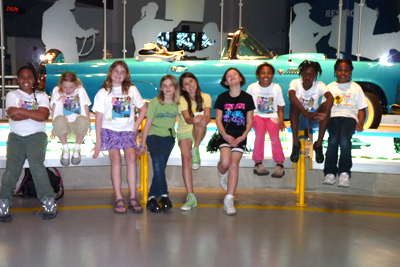
February’s Fabulous Food Excursions
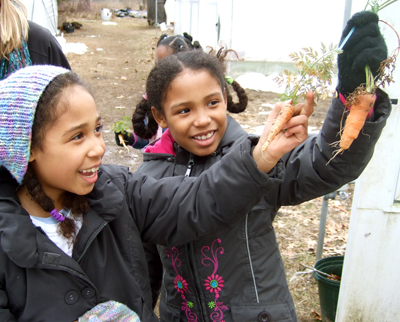
February’s theme for ECO Girls was "Food," and since it was close to Valentine's Day, we took a special interest in the origin and cultivation of chocolate. To start the day off, storyteller Elizabeth James told a traditional story about the beginnings of human enjoyment of chocolate titled “Little Blue Frog: the Aztec legend of Chocolate.” In the story, Quetzacoatl, the God of Delight, transforms into a little blue frog and shares the secret of the Sun God Nanahuazin's favorite treat with the people of the earth. Through his song (Ribbit, Ribbit!), the little frog reveals the location of the cacao tree so that the people can use its beans to make hot cocoa and eventually chocolate. After croaking along with the frog in the story, the ECO Girls watched a video on the process of harvesting cocoa beans and turning them into chocolate in a factory. We learned that after all the ingredients have been combined, the mixture undergoes “conching” in order to smooth the mixture. This process can take a few hours up to three days. Did you know chocolate contains over 300 mineral properties that are beneficial to your health? Some of them are known to help increase brainpower and function!
Not only did the ECO Girls learn about the cocoa plant and its uses, but they also studied one up close. We traveled to the Matthaei Botanical Gardens -- a paradise on earth in the middle of winter! Here the girls were able to explore different climate zones such as tropical, temperate, and arid and experience first-hand the unique vegetation that grows in diverse environments. Each zone in the indoor gardens forms its own beautiful masterpiece, showcasing some of the world's most exquisite plants and flowers. In the tropical zone, the ECO Girls saw and felt a cocoa plant. It was a breath-taking trip for us all.
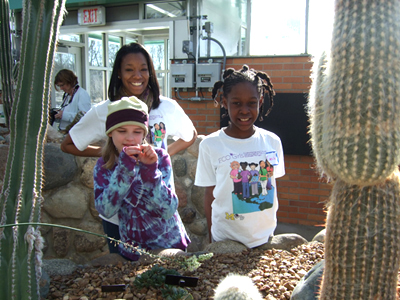
In the later part of the month of February the ECO Girls visited Brines Farm in Dexter, Michigan for a special tour led by Andrew Balabuch and Lauren Maloney. Brines Farm is a family owned organic farm striving to support the local community with healthy produce. While the girls were there, they learned about solar powered hoop houses and how many vegetables can be sustainable during the harsh, cold months of Michigan's winter. They learned about the Brines Farm Community Supported Agriculture (CSA) program, in which individuals register and pay a share to pick up a bag of whatever is fresh at the Ann Arbor Farmers Market for that week. In the latter portion of the trip, the girls learned about different types of soils, how vegetables’ success is dependent on the soil they are grown in, and the importance of nutrient-rich compost. Best of all, the girls got to harvest kale and carrots and thoroughly enjoyed snacking on these healthy treats that they had plucked from the ground themselves!
To view more photos of this event, visit our photo page.
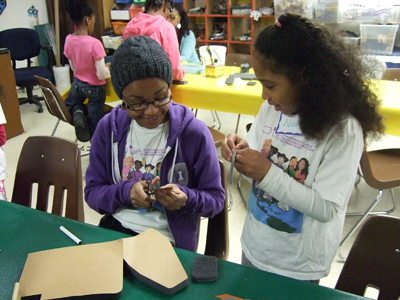
Creative Sustainability
Sustainability was the ECO Girls theme for the month of January. We pondered how everything we have originally comes from the earth, and considered that items we use every day consist of finite resources. Since these resources should be appreciated and conserved, we discussed the value of buying fewer commercial goods, reusing and repurposing what we have, and recycling, trading or giving away what we no longer need. For our Roots group meeting of 2nd-3rd graders at the YMCA in Ann Arbor, we wanted to create something that was personal, sustainable, and cozy for the winter time. After putting our heads together, we came up with the ECO Girls sustainable quilt project. To get into the quilting mood, we read aloud the fanciful picture book, Tar Beach, by quilter Faith Ringgold. Then, using scraps of old fabric brought in by the girls and volunteers, the Roots group created individual quilt block collages. Each of the quilt blocks reflected an outdoor scene: a pink-toed pig on a floral background, a sun shining down on a recycling symbol, a canoe on a lake in Michigan. A group favorite was the cuddly rainbow kitty made by one Eco Girl from a favorite fabric brought in by another. The girls got caught up in the pleasure of swapping and sharing and had fun seeing their old cloth put to new and surprising uses. They also got to practice the pre-sewing skills of tracing and cutting fabric. After the individual blocks were finished, a chaperone took the blocks home to sew them together into the first ECO Girls quilt! Stay tuned for photos of the finished textile masterpiece.
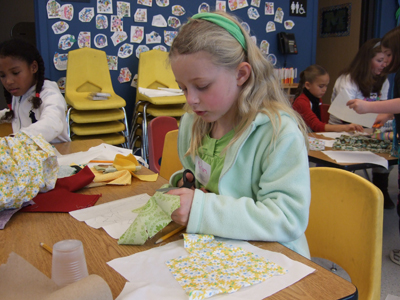
Later in the month, in a joint Roots (2nd-3rd grade) and Shoots (4th-6th grade) outing, the Eco Girls continued this sustainable creativity theme. After learning about sustainability and brainstorming ways that we can be more conscientious to help preserve the environment, the girls took a trip to the Scrap Box, a craft shop that repurposes cast-off things. During a tour of the Scrap Box, the girls learned that just because something looks like trash doesn't necessarily mean that it is. After collecting items like foam, scraps of plastic, scraps of paper, pipe cleaners, and more—the girls created their very own make-believe creatures with characteristics inspired by animals native to Michigan as well as fairytale animals like dragons or unicorns. The Eco Girls learned this mid-winter that using your imagination to turn old things into new things can make creativity both fun and sustainable. They also learned that if you concentrate hard enough, a cat with rainbow fur or a black bear with wings might just appear before your very eyes.
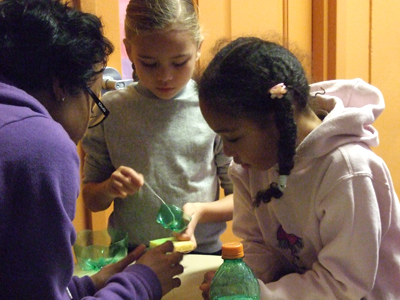
December's Winter Water-Land
This month ECO Girls took a look at water. We explored the basic properties of water as a liquid, solid, and a gas in perfect timing for the wonderful winter snow. At the UM Trotter Multicultural Center, the Eco Girls took part in a science experiment: growing snowflakes! They worked in teams to grow snowflakes, or ice crystals, in used (recycled!) plastic bottles. The snowflake experiment demonstrated the process of water starting out as a liquid and changing into a solid. It was magical for one of the Eco Girls, who marveled that it took a whole hour to grow a single snowflake, but just one second for a snowflake to melt on her fingertip. After the experiment, the girls broke into their Roots and Shoots groups. The Roots listened to a dramatic story about the water cycle, and the Shoots worked on writing Haikus with a water theme. (Read an inspired example below! You can find more of these water Haikus on The Buzz, Poetry section of the website.)
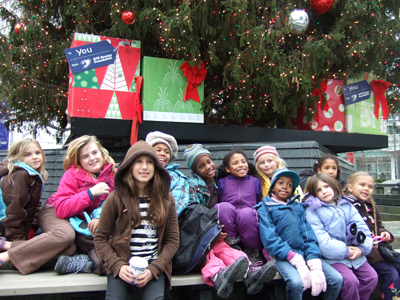
After the reading and writing breakout session, the Eco Girls loaded onto a UM bus and headed to Detroit for winter ice skating at Campus Martius Park! It was a joy watching the girls skate. Those who were more proficient at skating helped the others out, and one Eco Girl commented to a chaperone that she had dreamed her whole life of the day that she would go ice skating for the first time. Even the adult volunteers strapped on skates and made some loops around the rink. After skating the girls enjoyed delicious (and warming) cups of hot chocolate. On the bus ride home the girls entertained the volunteers with boisterous rounds of singing that drew even the shyer Eco Girls out. It was an enjoyable and exciting day for all.
A Water Haiku by Ellie (Eco Girl, age 11)
gliding, gaily, gracefully
moon walking on ice
Find more of these water Haikus on The Buzz, Poetry section of the website.
A Walk in the Woods
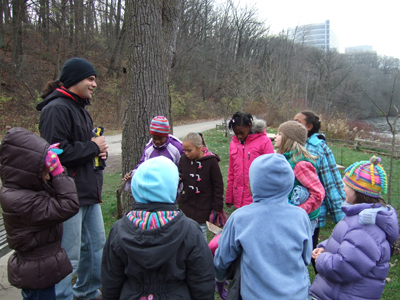
The month of November was all about “ecological literacy” for the Eco Girls. We wanted to learn about plants and animals in Michigan and how they interact within particular ecosystems. The Roots group visited the Leslie Science and Nature Center in Ann Arbor, where they observed Michigan birds of prey and selected one, a kestrel (small falcon), to adopt. (For a photo of the kind of bird that is the newest member of the ECO Girls family, visit the ECO Girls Facebook page.)
Two weeks later, both the Roots and Shoots gathered at the University of Michigan’s Museum of Natural History for a special lesson on ecosystems. Director of Education, Kira Berman, aided by graduate student and undergraduate student assistants, led the Eco Girls through an interactive presentation on ecosystems (pine forest, maple and beech hardwood forest, sand dune, and bog) followed by a test of soil samples from the nearby U of M Nichols Arboretum and an examination of various skulls to determine what kinds of animals they had come from and what those animals would have eaten. Is water biotic or abiotic? What about dead leaves on the ground? What is the difference between soil and dirt? Ask an Eco Girl!
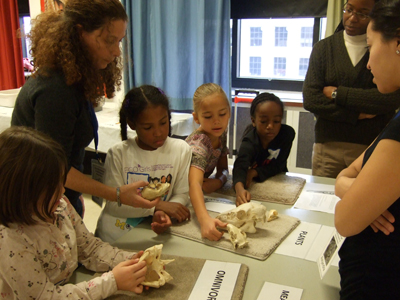
After the museum tour, the group walked to the Nichols Arboretum, where we took a sensory nature hike led by environmental educator and musician, Joe Reilly. Following a scavenger hunt and tree identification game, the Eco Girls settled down beside the Huron River (our local water source!) to draw sound maps that reflected the sounds that could be heard all around. Silent reflection and creation was the highlight of the outing for the kids as well as their adult chaperones. Perhaps the peaceful feeling experienced by the riverside—the sound of flowing water, bird calls, wind—will remain with the Eco Girls as they think about reasons to be thankful this holiday season.
To view more photos of this event, visit our photo page.
October Harvest Adventure
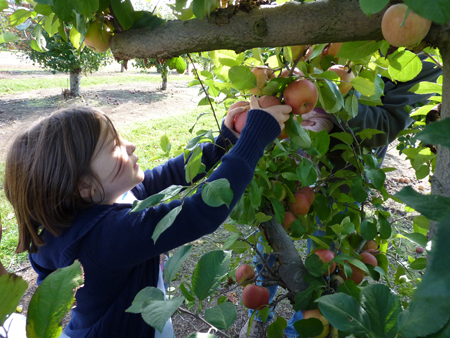
The month of October was all about food for the Eco Girls! We wanted to teach our Eco Girls where some of our food comes from, how it is grown, and what we do with it when we get it. What better way to do this than to take a trip where we could gather our own food, which is just what we did. We took an exciting adventure to Wiard’s Orchard and County Fair.
While at the orchard the Eco Girls had a chance to pick their own delicious apples. We also took a hay ride where we learned interesting apple facts. Did you know the apple blossom is Michigan’s state flower? After a terrific day at Wiard’s orchard and fair we brought our freshly picked apples back to the Trotter Multicultural Center where girls broke into teams of four to help the volunteers mix up some delicious apple pancakes from scratch. Then they listed to a story while the volunteers cooked up our apple feast. (Recipes are below.) All of the girls were able to take home some handpicked apples and a delicious pancake topped with the warm sautéed apples.
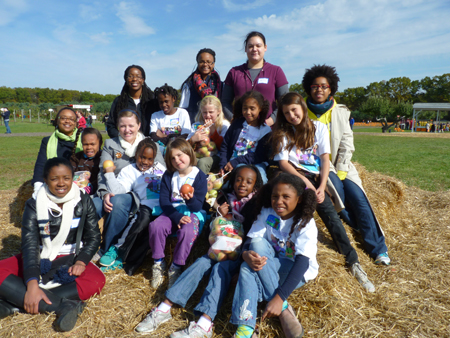
It is important to teach our children where their food comes from and to allow them to take part in preparing it. When they know where their food came from and how it was prepared they will be better equipped to make smart and healthy choices, which is something we want all of our Eco Girls and children to learn. All in all our October Harvest Adventure was a great success thanks to the wonderful Eco Girls and their volunteers!
To view more photos of this event, visit our photo page.
Sauteed Apples
(view recipe on AllRecipes.com)
Ingredients:
- ¼ cup butter
- 4 large tart apples — peeled, cored and sliced ¼ inch thick
- 2 teaspoons cornstarch
- ½ cup cold water
- ½ cup brown sugar
- ½ teaspoon ground cinnamon
Directions:
In a large skillet or saucepan, melt butter over medium heat; add apples. Cook, stirring constantly, until apples are almost tender, about 6 to 7 minutes.
Dissolve cornstarch in water; add to skillet. Stir in brown sugar and cinnamon. Boil for 2 minutes, stirring occasionally. Remove from heat and serve warm.
Apple Pancakes
(from "Apple Cookbook" by Olwen Woodier)
Ingredients:
- 2 cups sifted all-purpose flour
- 1½ teaspoons baking powder
- 1 teaspoon baking soda
- 1 teaspoon ground cinnamon
- 2 cups sour cream or 1½ cups plain yogurt
- ¼ cup apple juice or cider
- ¼ cup sugar or honey
- ¼ cup butter, melted
- 2 eggs
- 2 medium apples (McIntosh, Golden Delicious, Empire)
- vegetable oil for frying
- butter, lemon juice, sugar (optional)
Directions:
Place the flour, baking powder, baking soda, and cinnamon in a large mixing bowl, blender, or food processor. Add the sour cream, apple juice, sugar, butter, and eggs. Beat or blend until smooth. The batter will be very thick. Allow the batter to rest for 30-60 minutes.
Core and grate the apples. Stir into the batter.
Heat a heavy skillet over medium-high heat and grease with approximately 1 teaspoon of vegetable oil. Drop the batter onto the hot griddle a few tablespoons at a time (for larger pancakes, measure ¼ cup batter).
When bubbles appear on top after approximately 2 mintes, turn and brown the other side. Serve with butter, lemon juice, and sugar.
Yield: 4-6 servings (16-20 pancakes)

In the month of September ECO Girls focused on the theme of energy. The Roots group learned about the sources of energy on earth and the critical importance of the sun. We discussed how we get our energy from eating plants that get their energy from the sun (and sometimes from animals that eat plants too). We talked about the importance of conserving energy by reducing our use of fossil fuels (like coal and oil) whenever possible. When the Roots and Shoots group met together, we enjoyed the benefits of solar energy while eating our vegetarian lunch. Then we had a GoGirl dance party to get our bodies in motion and learn how we can create kinesthetic energy too!
Eco Girls have the power to save energy by turning off unused lights and appliances, avoiding food waste (it takes energy to grow and transport food), and walking or riding our bikes to get around.
Eco Girls have the power to create energy by getting our bodies in motion and using that momentum to change the world around us.
View photos of our GoGirl dance party!

At Ann Arbor's annual Earth Day Festival, held this year at Washtenaw Community College on May 1st, Clifford the Truck Farm was on display. Clifford, a project of the Ypsilanti based Growing Hope organization, will travel the area demonstrating gardening methods this season. Clifford had help preparing the soil in his truckbed from two "urban farm women," as Growing Hope's director Amanda Edmonds termed them, and future Eco Girls.
Read more about Amanda's passion for gardening here, and see how she and her co-workers are making a difference in our community.




